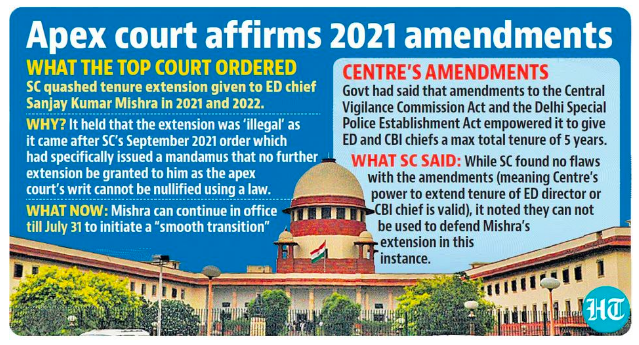Context:
Recently, the Supreme Court has asked the Enforcement Directorate (ED) Director to resign four months before his third extension ends in November.

Image Source: Hindustan Times
Background:
- 2018: Mr. SK Mishra is appointed as the Enforcement Directorate (ED) Director for a two-year term.
- 2020: The original appointment of the ED Director is retrospectively amended to extend the tenure to three years.
- 2021: The Supreme Court (SC) directs the government to stop granting extensions to the ED Director.
- 2021: Amendments are enacted to the Central Vigilance Commission Act and the Delhi Special Police Establishment Act.
- These amendments allow a maximum of three annual extensions (totaling a term of five years) to the Directors of the Central Bureau of Investigation (CBI) and ED, based on the recommendation of High-Level Committees.
- Previously: CBI and ED chiefs had fixed tenures of two years.
The High-Level Committees for Extensions of Service:
- For the ED Director: The panel consisted of a five-member committee comprising the Central Vigilance Commissioner and Vigilance Commissioners.
- They were responsible for recommending whether an ED Director should receive an extension in service.
- The committees were required to provide written reasons supporting their recommendations.
- For the CBI Director: The High-Level Committee for the CBI Director included the Prime Minister, Opposition Leader, and the Chief Justice of India.
- This committee was responsible for recommending whether a CBI Director should be granted an extension in service.
- Like the ED Director committee, this committee also had to provide written reasons to support their recommendations.
Recent Supreme Court Ruling:
- On Tenure Extension: The Supreme Court declared the consecutive service extensions granted to ED Director in 2021 and 2022 as illegal.
- As a result, the court ordered the present ED Chief to resign by July 31, facilitating a smooth transition to a new chief.
- On 2021 Amendments: Regarding the amendments made to the Central Vigilance Commission Act, 2003, and the Delhi Special Police Establishment Act, 1946, the Supreme Court upheld their constitutionality.
Conclusion:
At a time when there is a cloud of suspicion over the misuse of government agencies against political opponents, the Court’s endorsement of a tenure extension system designed to undermine their independence is not conducive to the rule of law.
About ED:
- The Directorate of Enforcement is a multi-disciplinary organization mandated with investigation of offence of money laundering and violations of foreign exchange laws.
Evolution of ED:
- 1956: The Enforcement Unit was founded within the Department of Economic Affairs of the Ministry of Finance.
- 1957: The Enforcement Unit was renamed as the Enforcement Directorate.
- 1960: The administrative control of the Enforcement Directorate was transferred to the Department of Revenue.
- Post-Liberalization Era: The nature of the Enforcement Directorate changed as India underwent economic liberalization.
- FERA 1973 was repealed, and the Foreign Exchange Management Act, 1999 (FEMA), came into operation on June 1, 2000.
The Present Mandate of ED: Presently, the ED deals with four laws
- The Prevention of Money Laundering Act, 2002 (PMLA)
- The Foreign Exchange Management Act, 1999 (FEMA)
- The Fugitive Economic Offenders Act, 2018 (FEOA)
- Conservation of Foreign Exchange and Prevention of Smuggling Activities Act, 1974 (COFEPOSA)
Powers of ED:
- Admissibility of Statements:
- Statements recorded before an ED investigation officer (IO) are admissible as evidence in court under the Prevention of Money Laundering Act (PMLA).
- Non-Bailable Offences:
- All offences under the PMLA, which the ED deals with, are classified as non-bailable.
- Custody Procedures: Individuals in ED custody are sent to the nearest police station’s lock-up, irrespective of its status.
- Challenges in Property Attachment:
- Once the ED attaches properties belonging to an accused, it can be a lengthy and challenging process to retrieve those assets.
- Burden of Proof on the Accused:
- Unlike regular criminal law, under the PMLA, the burden of proof lies with the accused rather than the prosecutor.
- Accused individuals are required to furnish proof in their defense, making it harder to deal with the ED’s investigations.
|
News Source: The Hindu
![]() 13 Jul 2023
13 Jul 2023

